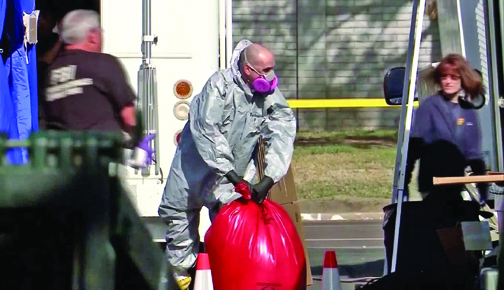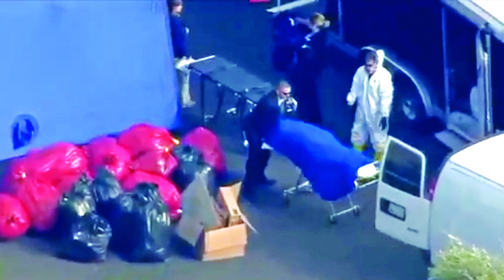by Robert Davis
Court records obtained by Glendale Cherry Creek Chronicle detail how Biological Resource Center (BRC), a willed body donation company headquartered in Arizona, illegally brokered infected body parts for profit.

Four years ago, the families who donated their loved ones to BRC filed a civil lawsuit alleging that BRC misled some customers to believe that their deceased would be left intact after donation. Instead, BRC dismembered the bodies and sold the parts across domestic and international borders. The lawsuit is ready to stand trial in the Maricopa County Superior Court on October 21.
One invoice recorded the sale of two heads for $500 apiece to a medical school in Israel. On another, a pair of shoulders went to Athens, Greece, for just $300. Someone’s arms made their way into a surgical workshop for $750.
This happened to families in Arizona, Michigan, and Illinois.
“It’s really body snatching without them having to dig up the graves,” Michael Burg, a Denver-based attorney representing eight of the plaintiffs, said in a press release about the case. “[BRC] lied to them.”
Background
The initial FBI investigation began in 2013 after officers in Houston caught wind of International Biological, Inc. (IBI), a body brokerage, shipping body parts across the southern border. State agencies recovered thousands of bodies and dozens of boxes of records from IBI’s offices in Michigan. Those records also implicated BRC and Anatomical Services, Inc. (ASI) in the crime.

After a lengthy investigation, it was determined that the three companies had been acting as one since at least 2008, when it began selling body parts to international clientele.
As a brokerage, the business marketed itself as one that didn’t sell infected parts. But, the investigation found that it made most of their money from bodies of people who suffered from sepsis, hepatitis B, C, and HIV, even when family death records explicitly stated so.
BRC’s warehousing process exposed much of its inventory to cross-contamination. A deposition from one of the FBI officers who raided BRC’s Arizona office revealed that body parts were often organiz-ed by limb after they were dismembered with infected parts mixed with clean ones.
Customers were never given access to any of the death certificates, medical records from donors, or medical social history questionnaires administered by BRC among caregivers or next-of-kin. If a customer found out the body they purchased was infected, BRC would offer to sell the body at a discounted rate in order to ensure the sale.
This is not the first time BRC owners Stephen and Sally Gore have been in a courtroom over their business practices. AZCentral reported that Stephen Gore had pled guilty to federal charges for the illegal use and sale of human body parts in 2014. He was sentenced to four years in prison, but served no time because of good behavior.
“Placement” And “Matching”
BRC also told donor families that they treated the deceased with dignity and respect. They offered services like the recovery of and “placement” and “matching” of tissue with scientists and medical researchers to unsuspecting customers. They printed details of these services in brochures and pamphlets that were given out in their offices.
To an untrained ear, this language sounds as if the deceased will be kept intact during transportation. But, as one customer who worked in the non-profit organ donation industry noted in her deposition, the terms “placement” and “matching” are code words for dismemberment.
“These words are meant to disguise the fact that BRC was helping medical providers find organ donors even after body donors asked them not to,” she said.
That customer’s mother came to be known as BRCIL-2013164. Her whole body was sold to IBI for $5,000 because her body contained hepatitis B. It was later dismembered and shipped on an international course.

Will Power
Typically, an individual’s last will and testament dictates how their body will be disposed of after death. However, enforcing the power of wills can be tricky because it falls under the broad domain of gift law.
According to the Clinical Journal of The American Society of Nephrology, the primary law governing organ donation in the United States is the Uniform Anatomical Gift Act (UAGA). UAGA was enacted as a part of the Uniform Codes, which are passed from state to state.
UAGA is “uniquely designed to support the system of transplantation” in that it “excludes [transplantation] from the federal prohibition, and because the donee of the anatomic gift is the transplant recipient, such payments do not abrogate the legal construct of organ donation as a gift.”
A key aspect of the law is consent, which differs from what doctor’s refer to as “informed consent.” Organ donors must consent for their organs to be harvested for transplants, which is as simple as having “ORGAN DONOR” on your driver’s license.
On the other hand, doctors are required to gain informed consent before treating a patient. Informed consent describes the process of discussing the risks and benefits of all available means of treatment with a patient. Since body donations don’t include the element of risk or benefit to the deceased because the transaction occurs after death, therefore, informed consent is not necessary.
BRC prepared questionnaires for customers asking if they wanted the deceased’s body organs to be placed and matched. However, those services didn’t only extend to those who marked “YES.”
Arizona has an especially lax enforcement system for these laws, which helped make it one of the nation’s hotspots for whole body donations. The entity in charge of overseeing these companies, Arizona’s State Health Department, focused its resources on combatting the opioid crisis instead of cracking down on illegal organ harvesting, according to an AZCentral report.
In contrast, Colorado has strict laws governing the operation of body donation companies and funeral homes, both of which are regulated under the same statutes. For starters, someone who owns a funeral home cannot simultaneously own a body donation company. Colorado also requires owners of either company to maintain records of where human remains are distributed.
Nearly 4,000 people — approximately seven percent of the state’s population — are whole body donors. That is roughly five-times the national average, the Illinois-based Cremation Association of North America says.
This ecosystem helped BRC expand its territory across the Atlantic.
BRC made little effort to conceal its business dealings, according to the court documents. Potential customers would contact BRC’s office in Illinois. If that location didn’t have the requested body parts, Gore provided the body part from Arizona. Records for all of the transactions were stored in each of the company’s offices.
To Burg and the other lawyers representing the plaintiffs, the case does not question organ donation as a whole. It asks if the consent of the dead matters as much as the will of the living.
“If someone says we’ll pay for expenses and cremation and your loved one’s body will go to specific places (to help cure diseases), you are pretty much going to say, ‘Sure, why not?’” Burg told AZCentral. “Am I saying none of these places are legitimate? No. But there have been a sufficient number of cases where misrepresentations have been made. There’s a price list for everything from a head to a shoulder, like they are a side of beef. They make money, absolutely, because there’s no cost in getting the bodies.”
